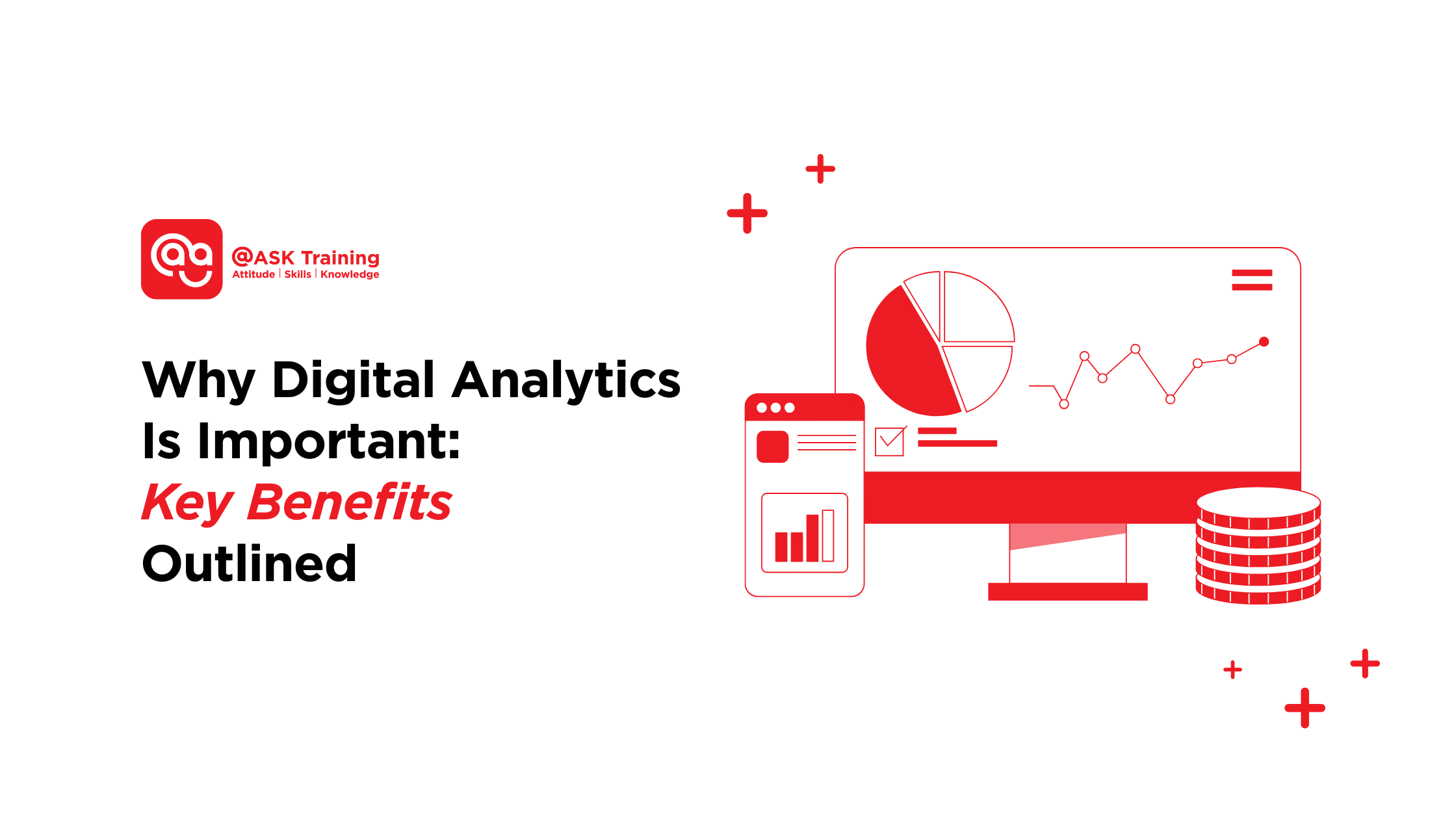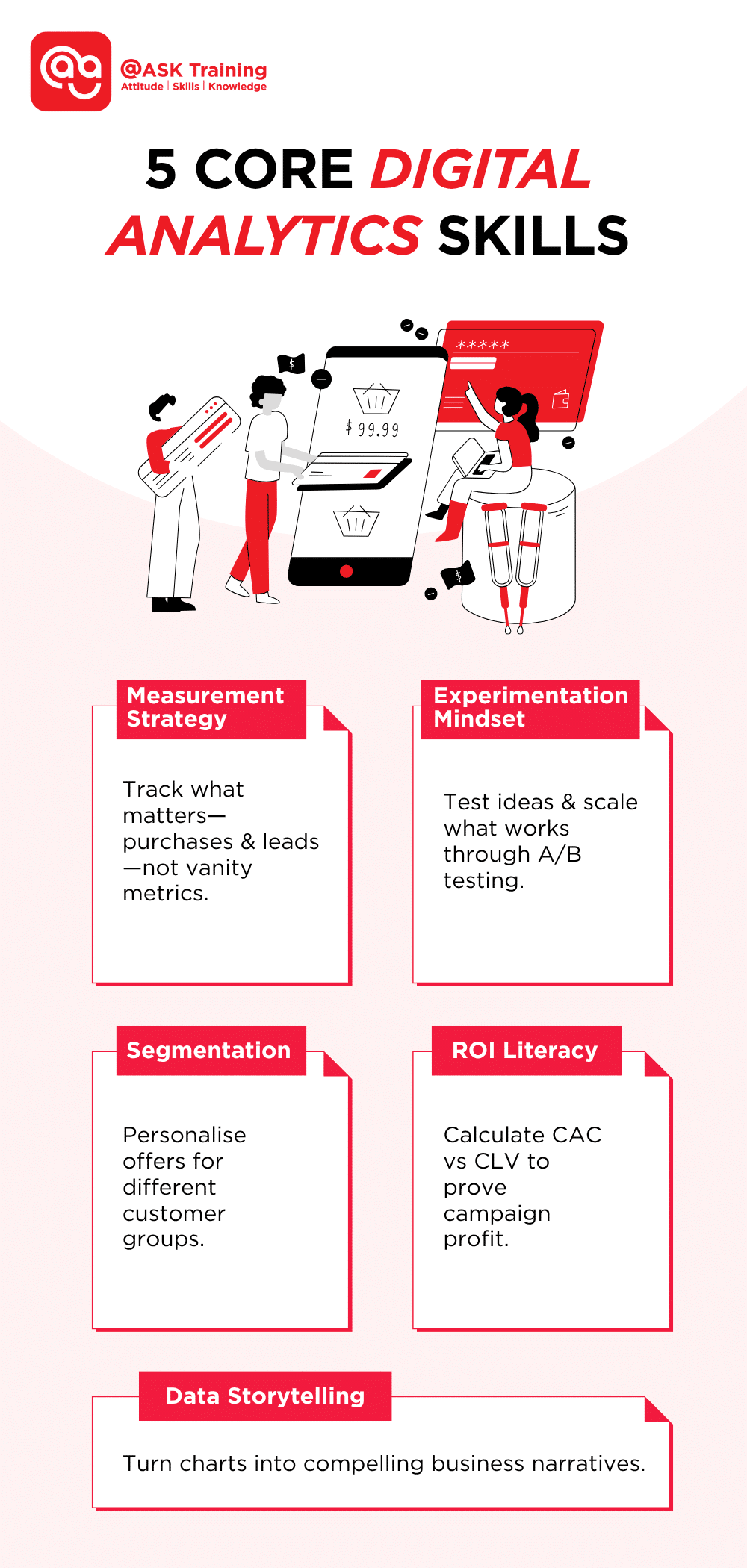
Without a clear map, it’s easy to pour budget into channels that seem effective while missing the ones that truly drive results.
That map is digital analytics.
More than just tracking website visitors, digital analytics is the practice of measuring, analysing, and interpreting data from all your digital touchpoints—ads, social media, email, search, and your website—to understand their impact on crucial business outcomes like sales, leads, and customer loyalty.
In this article, we’ll move beyond the “what” and show you precisely why digital analytics is important for your career growth and business success in Singapore’s digitally-accelerated landscape.
To build that understanding, let’s start with a clear, one-minute explainer of what digital analytics truly entails.
What is Digital Analytics? (Your One-Minute Explainer)
Forget thinking of analytics as just a dashboard of website stats. Modern digital analytics is a connected story. It’s about linking your marketing actions to tangible business results.
Imagine this: A potential customer sees your Instagram Reel about a new service, later searches for you on Google, reads a comparison blog on your site, and finally submits an enquiry form.
Digital analytics is what connects that entire journey, showing you that the Instagram Reel started the conversation and the blog post sealed the deal.
This holistic view is the foundation of smart marketing, and it’s a core skill you’ll master when you learn digital analytics.
Now that we have a clear definition, let’s explore the tangible advantages this knowledge unlocks for you and your business.
Why Study Digital Analytics Now? The Career & Business Upside
Upskilling in analytics isn’t just about reading charts; it’s about gaining a strategic advantage. Here’s how:
1. Make Confident Decisions, Not Guesses
Replace “I think” with “I know.” With solid data, you can defend your budget proposals to managers or clients with undeniable evidence of what’s working and what’s not.
2. Run Faster, Safer Experiments
Data literacy allows you to conduct A/B tests on everything from ad copy to landing pages. You can quickly identify winners, scale them, and pause underperformers, drastically reducing wasted ad spend.
3. Accelerate Your Career Trajectory
Proficiency in analytics is a direct path to roles like Performance Marketing Manager, Growth Marketer, or Marketing Ops Specialist. It’s the clearest way to demonstrate value and secure that promotion.
Ultimately, building digital analytics skills transforms you from a marketer who executes tasks to a strategic partner who drives growth.
But what specific, job-ready abilities will you gain from a dedicated programme of studying marketing analytics?
Skills You’ll Gain and How They Show Up on the Job
A quality analytics training programme equips you with practical, applicable skills that you can use from day one.
1. Measurement Strategy
You’ll learn to set meaningful goals and define the key events (e.g., “purchase,” “lead form submit”) that prove success, moving beyond vanity metrics.
2. Experimentation Mindset
You’ll confidently run A/B tests, learning to validate hypotheses (e.g., “This headline will convert better”) and scale what truly works.
3. Segmentation & Journey Mapping
Move beyond one-size-fits-all marketing. You’ll learn to tailor offers.
For instance, a tourism business could show “Weekend Surf Classes at Sentosa” to local audiences and “Cultural Tour Packages” to overseas visitors.
4. ROI Literacy (CAC & CLV)
You’ll master core metrics like Customer Acquisition Cost (CAC) and Customer Lifetime Value (CLV).
If a campaign costs $10,000 and yields 80 customers, your CAC is $125. Comparing this to the CLV tells you instantly if the campaign is profitable and scalable.
5. Data Storytelling
The most crucial skill of all: turning complex dashboards into a compelling narrative that stakeholders understand and act upon.
These competencies are not just academic; they are exactly what employers are actively seeking and rewarding today.
Proof It Matters: What Employers Measure & Reward Today
The job market has spoken. Marketing analytics careers are booming, and for good reason.
Employers and hiring managers now prioritise candidates who can demonstrate:
- Attribution Capability: The skill to show how different channels work together to drive a sale (the essence of marketing attribution).
- GA4 Familiarity: With the sunset of Universal Analytics, proficiency in GA4 is no longer a “nice-to-have” but a core requirement.
- Outcomes Focus: A shift from reporting on clicks and impressions to reporting on leads, pipeline impact, and revenue.
Teams that can articulate channel interplay and prove ROI earn greater budget trust and a seat at the strategic table.
This high demand makes the decision to learn digital analytics one of the most impactful career moves you can make.
But don’t just take our word for it; let’s look at what graduates of practical programmes achieve in the real world.
Real Outcomes: Mini Case Vignettes from the Field
Here’s how applied digital analytics skills create immediate impact:
The Budget Shift
- Marketing manager found that YouTube was the top assist channel for the highest-value leads, despite fewer direct conversions
- YouTube ads in Singapore are reported to deliver cost-effective lead volumes and strong multi-channel attribution value
- Budget shifted by 15% toward YouTube, resulting in a 22% increase in qualified enquiries in the following quarter
- Reflects the local trend where agencies recommend YouTube for lead generation due to its assist role in customer journeys
(Sources: YouTube Ad Costs in Singapore, Video Marketing Trends 2025 Singapore)
The Singapore-Flavoured Test
- Local F&B owner ran a geo-targeted offer: “1-for-1 Lunch Deals – Available in Raffles Place Only”
- Singapore’s dense urban districts make geo-targeting effective for localised promotions
- Similar campaigns in Singapore show 40%+ higher redemption rates for segmented, location-specific offers compared to generic promotions
- This leverages Singapore consumers’ preference for relevant, hyper-localised deals
(Sources: Top 10 Restaurant Marketing Campaigns in Singapore, Effective Restaurant Marketing Strategies Singapore, TikTok to Table)
The Landing Page Tweak
- A/B test compared landing page headlines: “Instant Quote” vs. “Get Your Custom Quote Now”
- Resulted in 18% lift in click-through rates and a 12% reduction in cost-per-click
- Singapore SMEs and hospitality brands often see double-digit improvements from small CTA or headline tweaks
- Highlights the importance of continual optimisation based on testing in competitive local markets
(Source: How Singapore’s Hospitality Groups Leverage A/B Testing)
These are the tangible results that stem from a methodical approach to data. And with the rise of AI, these foundational skills are becoming even more powerful.
AI Won’t Replace You – It Supercharges Trained Marketers
Many fear that AI will make analysts obsolete. The opposite is true. AI is a powerful amplifier for those with solid digital analytics skills.
AI can handle forecasting, anomaly detection, and audience clustering at speed. But it takes a trained marketer to:
- Ask the right strategic questions.
- Ensure clean, accurate data tracking.
- Interpret the AI’s output and craft a persuasive narrative for stakeholders.
For example, an AI can flag an anomaly—a sudden drop in conversions. A skilled human then diagnoses the issue, finds a broken tracking tag, fixes it, and prevents a week of wasted budget and misguided decisions. The human insight is irreplaceable.
This powerful combination of human expertise and AI is within your reach, but is this the right path for you to take?
Is This for You? A Quick Self-Check
You don’t need to be a data scientist to succeed.
You likely are a great fit if you:
- Are naturally curious about why certain marketing efforts succeed or fail.
- Feel comfortable working with spreadsheets (or are willing to learn).
- Are open to testing your assumptions and learning from the results.
- Want to reduce wasted spend and make every marketing dollar count.
No advanced math is required. A consistent, practical mindset matters more than complex theory. The goal is to apply these concepts immediately to improve your current campaigns.
If this sounds like you, the next step is to find the most effective and structured pathway to gain these skills.
Your Fastest Path in Singapore: Structured Learning with @ASK Training
Navigating the world of data alone can be overwhelming. A structured course provides the foundation, framework, and confidence to apply these skills correctly from day one.
At @ASK Training, we’ve designed our curriculum specifically for the Singapore market, focusing on the hybrid models that local businesses operate.
Our pathway helps you:
- Build Fundamentals: Start with a short course to master core concepts, GA4 event planning, and measurement strategy.
- Progress to Application: Advance to modules on experimentation, advanced segmentation, and marketing attribution models.
- Achieve Mastery: Learn to calculate and optimise for CAC and CLV and become proficient in data storytelling.
Whether you’re an individual seeking to future-proof your career or an HR leader looking for a reliable analytics training Singapore partner for your team, we have a programme to meet your needs.
Wrapping Up
We’ve outlined a clear case: digital analytics is the key to unlocking confident decisions, efficient budgets, and accelerated career growth in today’s market.
By developing job-relevant digital analytics skills, you position yourself at the forefront of modern marketing, ready to leverage AI and meet employer demand head-on.
Here’s a recap of core skills you’ll gain in digital analytics:
The question is no longer why digital analytics is important, but when you will choose to master it.
Don’t let another month of guesswork and wasted potential go by. Take the first step to future-proof your career and your marketing performance.
Ready to Stop Guessing and Start Knowing?
You’ve seen how digital analytics transforms marketing from a cost centre into a growth engine. Now it’s time to build these high-demand skills with Singapore’s most practical analytics training provider.
@ASK Training offers structured pathways to mastery, whether you’re looking to master GA4, understand marketing attribution, or become fluent in ROI metrics like CAC and CLV.
Here is our range of Digital Marketing courses you can explore:
- Digital Marketing Analytics (GA4) Course
Master Google Analytics 4 (GA4) to truly understand your campaign performance and customer behaviour. - Advanced Digital Marketing Analytics Course
Move beyond basic reports and use GA4 to make powerful, data-driven decisions that fuel business growth. - Website Landing Page Optimisation Course
Turn more visitors into customers by learning how to design high-converting websites and landing pages.
Enrol with us and secure your competitive edge today!
Related Courses
- WSQ Digital Marketing Analytics (Google Analytics) course
- WSQ Advanced Digital Marketing Analytics (Google Analytics) course
◆◆◆

